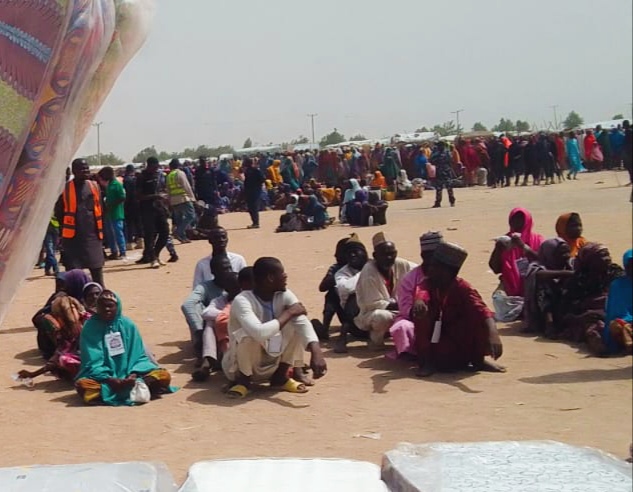Thousands of Nigerian refugees in Niger are pleading with the Borno State and federal governments to beef up security so that they can return to their hometowns and live in peace.
Thousands of Nigerian refugees in neighbouring Niger are pleading with the federal and Borno State governments to beef up security in their ancestral hometowns and to fast-track their safe return.
They say they are fed up with the challenges they face every day in the refugee camp in Diffa in the Niger Republic, which include extremely poor living conditions, abject poverty and the lack of basic amenities such as clean drinking water, food, shelter, education and healthcare services.
The refugees – most of whom escaped from border communities in the Abadam and Guzamala local government areas in the far northern region of Borno State – fled to the Niger Republic to escape deadly attacks by Jamā’at Ahl as-Sunnah lid-Da’way Wa’l-Jihād (JAS), more commonly referred to as Boko Haram, and Islamic State West Africa Province (ISWAP) insurgents.
Many of the refugees have been living in the Diffa region in the extreme southeast of Niger, near the border with Nigeria, for as long as 10 years, having fled Borno State at the height of the 15-year conflict.
The refugees made the call after learning about the recent repatriation of about 2,000 Nigerian refugees who were living in the Minawao Refugee Camp in the extreme north of Cameroon in the department of Mayo-Tsanaga in Mokolo Province.
The refugees were successfully resettled in Banki, their ancestral hometown, in the Bama Local Government Area of Borno State.
Their return was part of the second phase of voluntary repatriation.
Refugees in the Niger Republic said it was time for them to return home too.
Babagana Bulama Ganjer is a refugee originally from Malam Fatori, the headquarters of Abadam Local Government Area. The town became a stronghold of the JAS during the insurgency but Nigerian troops managed to dislodge them.
Ganjer said he fled to the refugee camp in Diffa almost nine years ago.
He told RNI that the living conditions were extremely poor and most of the refugees were starving.
“One of the greatest challenges confronting us is hunger. We do not get enough food to eat and the little we have is not nutritious. That’s why most of our children are malnourished. The Borno State government has distributed food to us only once since we fled our ancestral hometown to escape the Boko Haram insurgency.
“We really want to go back home because there is no place like home. We heard that Nigerian refugees in Cameroon have been repatriated. That is why we are begging both the Borno State and the federal governments to put in place all the necessary security measures in our hometowns so that we can be safely repatriated as soon as possible.
“As much as we are desperate to return home, we will not go voluntarily until we are certain that our hometowns are safe. Every security measure must be in place before we return.
“Not so long ago, the Borno State government repatriated about 500 refugees from the camp in Diffa and resettled them in Malam Fatori.
“The government claimed that the repatriation had been successful. But after a few months, most of those who had been repatriated came back to the camp in Diffa. They told us it was not safe to return home; that Boko Haram was still carrying out attacks and that living in Malam Fatori was still dangerous.”
Ganjer said there had to be adequate security measures in place to ensure the protection of lives and property.
“People must feel safe when they return home. We do not want to live in fear, terrified that we could be attacked by insurgents at any time.”
Malam Abubakar, also a refugee originally from the Abadam district, told RNI that it was time for the Borno State government to take decisive actions to address the plight of Nigerian refugees in Diffa.
“To be honest, we are in a dilemma. If we return to our ancestral hometowns, we fear we will be attacked by Boko Haram. But if we continue to stay here, poverty and hunger will kill us.
“We cannot do business here and we cannot farm. We have nothing. Our children are getting sick because they are hungry all the time. The little food we manage to scrounge is not nutritious. Every day we see our children getting weaker. It is hard for everyone in the camp but especially for the women and children.
“We are pleading with the Nigerian government to send us emergency humanitarian provisions – including food – and to fast-track our repatriation.
“As soon as all the necessary security measures are in place we want to go home. Our greatest wish is to be able to conduct business activities and farm as we did before the insurgency. We just want to go home and live without fear. We do not want to live under the threat of attacks by insurgents.”
Last week, Babagana Umara Zulum, the governor of Borno State, held talks with a delegation from the United Nations High Commissioner for Refugees (UNHCR) during which he emphasised the need to collaborate to ensure Nigerian refugees in neighbouring countries are repatriated and resettled in a dignified manner.
“We express our gratitude to UNHCR for facilitating the repatriation of individuals from Cameroon and anticipate similar actions for Nigerian refugees in Chad and the Niger Republic. Our partnership with UNHCR remains strong, emphasising the dignified return of individuals to their communities.
“We have initiated an appeal for the repatriation of our people and we urge the UNHCR to align with our strategies.”
SHETTIMA LAWAN MONGUNO









